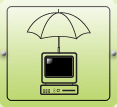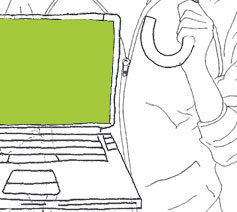|
||||||||||
 |
||||||||||
Keep Your Computer Safe |
||||||||||

|
Even if you're not participating in chat rooms, making purchases online, or meeting online friends in the real world, there are risks inherent in being online—risks against your computer which you can easily avoid.
|

|
||||||||
Ban SpamIn most cases, spam - unsolicited or junk e-mail - is simply an annoyance. It might be an advertisement for a product you don't need, or for an explicit website that you don't want to see. From the spammer's perspective, these messages are a cheap form of advertising - according to one report, 5% of e-mail users have purchased a product they heard about through spam. From the user's perspective, these messages are just filling up your inbox and eating up your time. Other messages, however, can be much more dangerous - some spam carry viruses that can destroy your data and damage your computer, others are scams promising large amounts of money (provided you forward your bank account information), and still others are phishing scams, seemingly from companies you do business with and trust, seeking to steal your identity. Are you making your spam problems worse?There are a couple of things you can do to reduce the amount of spam that makes its way to your inbox - and some things you can do to make the problem far worse. Overall, the two key strategies are to ignore spam and guard your e-mail address.
Or GetNetWise's Spam resources |
What are the risks?Keeping your computer healthy can be much the same as keeping yourself healthy: downloading the latest updates and using both anti-virus and spyware software can help keep your computer running at its best. Failing to do so can result in a slower, less enjoyable experience. Even more importantly, leaving your computer susceptible to things like viruses and spyware could lead to destroyed data or even worse, identity theft. Why would someone attack my computer?You've probably heard about people hacking into banks and corporate computer systems to steal information, but big companies aren't the only ones at risk. Individuals have a lot of valuable information that could be of interest to hackers, as well. With more and more personal information being shared online and stored on computers—like credit card numbers, banking information, and other key pieces of your identity—individuals are increasingly at risk. |
Should You Really Be Worried About Viruses? |
|
How can you keep your computer virus-free? First, be sure to install the latest software updates for your operating system (see below). Second, install antivirus software. Many options available, ranging in price and varying by operating system. Some of the most popular antivirus programs are made by Symantec and McAfee. If you are using a Windows PC, you can visit the Microsoft website to try out some of the major antivirus options free for up to a year. After you install virus software, in order for it to be effective, you have to keep it up-to-date with the latest virus definitions, and run it regularly. You can also set up most antivirus programs to check your incoming e-mail for viruses, which will reduce your risk even further. The process for setting up these options vary by program. The last thing you can do, if you have a broadband Internet connection, is install a firewall. Firewalls limit the traffic coming into and leaving your computer, and can significantly reduce the likelihood that a hacker can use a virus, worm, or Trojan horse to steal your personal information. If you are using Windows XP Service Pack 2 or Mac OS X, you have a firewall built into your computer—for more information on how it works, check with Microsoft or Apple. You can also purchase a firewall, which could be a piece of software, or hardware—hardware firewalls are often included with the routers used for home networking. |
|
What is Spyware? |
|
|
Spyware is the software that you might have noticed is slowing down your computer, changing your web browser's homepage, generating endless pop-up ads, and in some cases, collecting your personal information. It may have been installed when you opened an attachment in a spam message, when you downloaded something that wasn't what it purported to be, or it may have been bundled with software you use for something else. However it got to your computer, it's probably annoying, potentially dangerous, and quite likely hard to get rid of.
Rather than trying to hunt down the spyware on your computer yourself, you might want to use an antispyware program that can remove any existing suspect software and regularly scan your computer for any new problems. For computers running Windows, your options include Microsoft Antispyware (beta) , Lavasoft Ad Aware, or Webroot Spysweeper among many others. One note about these programs: because new types of spyware are finding their way onto computers all the time, it is important to keep your antispyware software up-to-date. Many have an option to automatically update—this is a great idea. |
|
Keeping Up-to-Date |
|
|
How often have you heard that "nothing is perfect"? Well, it holds true for computers, as well. No matter which operating system you're using, people are finding new problems everyday. Some of these problems could open your computer up to hackers, viruses, and other problems if they're not solved—even if you have virus and spyware software running. Making sure you have all the latest software updates from the manufacturer of your operating system can help to minimize these imperfections.
If you're using a Windows PC, you can download the latest security updates here, and if you have an Apple Computer, you can find them here. |
|
